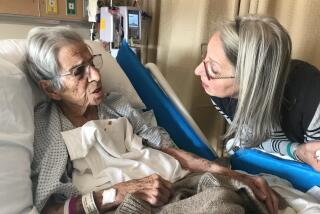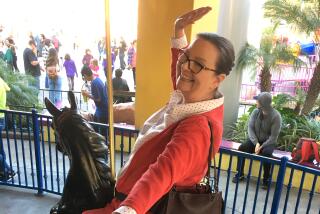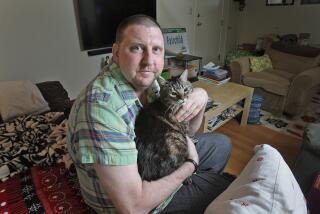Most Believe Cycle of Life Goes On : Cancer Nurses Make Peace With Death
A terminal leukemia patient under the care of cancer nurse Sheila Evans died a pleasant death a few days ago.
The use of the word “pleasant” to describe death might strike someone who is not a nurse as bizarre, concedes Evans, a hospital nurse at the UC San Diego Medical Center.
But the woman told Evans of feeling prepared to die, of having seen a white light, of achieving peace. Evans had been able to help the woman prepare for her physical end because of Evans’ own philosophical consideration of dying and mortality.
“You must be comfortable with the idea of death, of having thought about your own mortality, or you won’t last (as a cancer nurse),” said a colleague of Evans, Linda Meixter, nurse coordinator at the UCSD Cancer Clinic. “Patients will ask us: What will death be like? Will it be painful? They know when it is time to die, when not to fight the pain any longer.”
Death will never be first on society’s list of dinner conversation topics. Most people become visibly uncomfortable when discussing the inevitability of dying, of their own mortality.
But, for cancer nurses, the frequent exposure to death forces them to confront their own beliefs about death more often and to a far greater degree than the general public, in order to deal both professionally and compassionately with their patients. Most of the patients have illnesses that are life-threatening, and many have but a short time left to live.
At a 1984 nationwide seminar for cancer nurses at Scripps Memorial Hospital in La Jolla, the American Cancer Society surveyed 185 attending nurses on their views toward death, using a detailed series of questions developed originally for the periodical Psychology Today and given to that magazine’s readers in the early 1970s.
The results, released only last month, indicate that 71% of the nurses believe in a life after death, compared with 43% of the general public as defined in the Psychology Today polling. Among the nurses, 53% said they strongly believe in a life after death, and 18% tend to believe in it. And 73% said that they strongly wish for existence of a life after death, regardless of whether they personally believe it does exist, compared to 55% of the public in the magazine survey.
“I can well understand the results,” said Scripps cancer nurse supervisor Kathy Diss, in a conversation echoed by her colleagues at several hospitals. “A belief in a life after death is a coping tool for us, to deal with the different perception of death that we have, our much greater familiarity, compared to the general public.”
Not that all cancer nurses have uniform views on religion and death. To the contrary, each nurse approaches the topic a little differently.
“I think you can say that the majority of nurses I work with have a sense of spirituality, a belief in something more than just themselves,” said Joan Krogmeier, a member of Mercy Hospital’s chaplaincy services department who works with cancer nurses and patients. “Whether or not they express that spirituality through religious belief, that is neither here nor there. But they do acknowledge the spiritual part of the body.”
Scripps nurse Lucie Lavoie-Smith, a longtime cancer specialist, differentiated between religion and spiritualism in attempting to define a life after death.
“I think you can believe in a life after death without it being part of organized religion, that a God or someone else is necessarily waiting for you,” Lavoie-Smith said. “You can believe that a spirit comes back in the cycle of life, or something like that, which to me is more spiritual than religious.”
Diss said that nurses are vulnerable to the added stress of facing death regularly when they first come into the area of cancer treatment. As a result, they look for a philosophy that can help them deal with the problem, drawing upon their own religious upbringing, previous nursing experience and seminars designed for dealing with dying.
“I was raised a Catholic and of course from that I believe in a life after death, but now (after having worked with cancer patients) I believe in it a heck of a lot more,” Veronica Stone of Scripps said. “I don’t consciously think about this day-to-day, but probably my work in oncology has had a subconscious influence on me (in considering the consequences of death).”
Colleague Cheryl Kosits added: “Now, I am not afraid of having a relationship with a patient who is going to die. I don’t say to myself, ‘What will I do if I take care of them and they die?’ That fear is gone.”
“The first time that someone dies, you think, ‘Is the soul there? Can they hear me? Can they not hear me? ‘ “ UCSD’s Evans said. “But I had thought about that somewhat before I became a nurse here. I don’t feel that I grapple daily with the concept of life after death. I’m not trying to decide; I have my own view that I work with.”
The nurses said they do not attempt to force their views upon patients. They do not initiate conversations about death with a patient but remain ready to share their thoughts should the person want to talk with them.
“Only if the patient wants to talk, will I talk about things religiously,” Evans said.
“We let the patients take the lead on matters of spirituality, of ideas of life after death,” Mercy’s Krogmeier said.
In many cases, the patients are more concerned about the process of dying, seeking reassurance that they will not be left alone and in pain, Barbara Cash of Mercy said.
“At first, it was hard for me to talk with a patient about death,” Cash said. “But they need to talk to someone, and many patients are not really free to talk easily with their families about dying.”
Cancer nurses, particularly those who work in the outpatient clinics, see patients over and over, often for several years. As a result, personal relationships sometimes develop that, when they end with the death of the patient, can challenge even the most prepared of nurses.
“We know our patients much, much closer than, say, a nurse in the emergency room, who may see a person only once briefly,” Kosits said. “There can develop a real closeness before they do die.”
“You can’t get attached to everyone personally or you would go crazy (after they die),” Meixter said.
UCSD Clinic nurse Carol Horton has a policy not to visit a longtime clinic patient when and if that person is admitted to the hospital for the terminal phase of illness.
“I want to remember them as I saw them in the clinic, not in the final days with tubes in them and the eyes not focusing,” Horton said. “A couple of times I have broken my own rule and regretted it later since I became depressed after seeing someone I had taken care of for three years.”
The nurses cope with their work in part by trying to leave it when they go home at night. “I do know when to clear my mind by going jogging, by taking care of myself, if I find myself getting too close with someone,” Kosits said. “But there are times when all of us grieve.”
Yet ultimately, the nurses find there is little turnover in their deparments and acknowledge the stability that their philosophies help create.
“Why does all of this help me?” Stone asked. “In a practical sense, I hope that something else is out there, that all the suffering isn’t for naught. A patient puts everyone at ease as well sometimes by telling us all to relax, that ‘Hey, I’m going to greener pastures.’ ”






